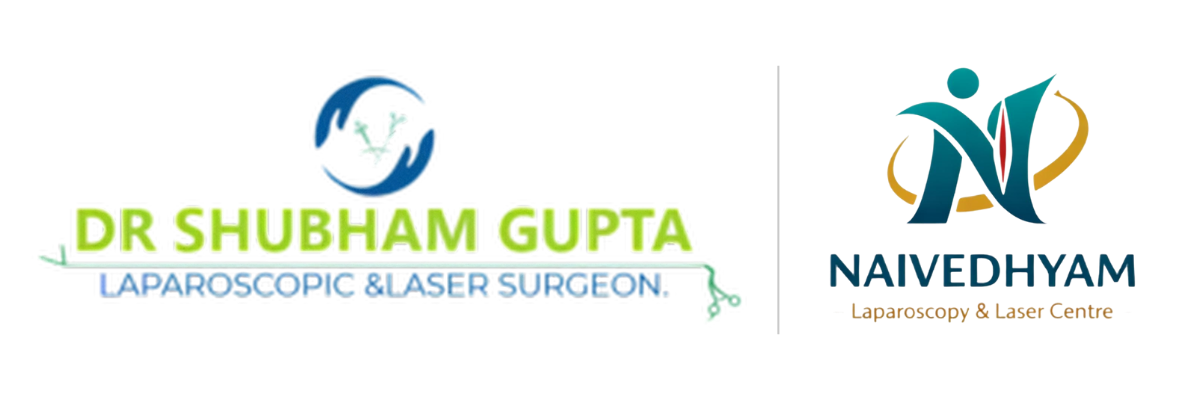In this blog, we will discuss what a hernia is, its causes, what laparoscopic hernia surgery involves, and how to take care of yourself after the procedure.
What is Hernia
A hernia occurs when an organ or fatty tissue pushes through a weak spot in the surrounding muscle or connective tissue. It usually appears as a bulge under the skin, and while it might not always be painful at first, it can worsen over time if left untreated.
Hernias can develop in different parts of the body, but the most common areas include the abdomen and groin. The main types are:
- Inguinal hernia – in the groin area, more common in men
- Umbilical hernia – near the belly button
- Incisional hernia – at the site of a previous surgical cut
- Femoral hernia – upper thigh area, more common in women
Without treatment, a hernia can become larger and may lead to complications such as strangulation, where the blood supply to the tissue is cut off — this requires emergency surgery.
Common Causes of Hernia
Hernias are often caused by a combination of muscle weakness and strain. Some people are born with weak abdominal muscles, while others develop weakness over time due to lifestyle or health conditions.
The most common causes include:
- Lifting heavy weights without proper technique
- Chronic coughing or sneezing
- Being overweight or obese
- Constipation and straining during bowel movements
- Previous abdominal surgery
- Pregnancy, which puts extra pressure on abdominal muscles
In many cases, hernias are preventable with a healthy lifestyle, weight management, and proper posture during lifting. However, once a hernia develops, surgery is usually the only permanent solution.
What is Laparoscopic Hernia Surgery?
Laparoscopic hernia repair is a modern surgical method that uses a special instrument called a laparoscope — a thin tube with a camera — to view the hernia from inside the body. The surgeon makes a few small cuts (usually 0.5–1 cm) in the abdomen instead of one large incision. Surgical tools are inserted through these cuts to repair the hernia and strengthen the weak spot using a medical mesh.

Advantages of Laparoscopic Surgery
Compared to traditional open surgery, laparoscopic surgery offers several benefits:
- Smaller incisions and minimal scarring
- Less pain after surgery
- Faster recovery time
- Lower risk of infection
- Quicker return to work and normal activities
For many patients, this approach means they can go home within 24 hours and resume light activities within a few days.
Why Choose Dr. Shubham Gupta in Gwalior?
Dr. Shubham Gupta is known for his expertise in both laparoscopic and general surgeries. He uses the latest surgical techniques to ensure patient safety, minimal discomfort, and faster recovery.
Patients choose Dr. Gupta because:
- He has extensive experience in laparoscopic hernia repair.
- He provides clear explanations and answers all patient questions.
- He uses advanced equipment and safe surgical methods.
- He offers personalized post-surgery care.
- He is committed to achieving the best possible results for every patient.
His patient-focused approach ensures that each person receives the right treatment plan based on their health condition and lifestyle.
Post-Treatment Care After Hernia Surgery
Recovering properly after hernia surgery is essential for a successful outcome. Even though laparoscopic surgery allows for a quicker recovery, patients should still take care during the healing process.
Here are some important post-surgery care tips:
- Follow your doctor’s instructions – Take prescribed medications, follow the recommended diet, and keep the surgical site clean.
- Avoid heavy lifting – Give your muscles time to heal by avoiding any heavy weights or strenuous activity for a few weeks.
- Eat a balanced diet – Include fiber-rich foods to prevent constipation, which can put pressure on your healing muscles.
- Stay active but gentle – Light walking improves blood flow and speeds up recovery, but avoid high-impact activities.
- Monitor the incision sites – Watch for redness, swelling, or discharge and inform your doctor if you notice anything unusual.
- Attend follow-up appointments – This ensures your recovery is on track and any concerns are addressed quickly.
When to Seek Medical Help
After surgery, it’s important to watch for warning signs. Contact your doctor immediately if you experience:
- Severe or increasing pain
- Persistent fever
- Excessive swelling or redness at the incision site
- Difficulty breathing
- Persistent vomiting
Early attention can prevent complications and ensure a smooth recovery.
A hernia will not go away on its own — the only permanent solution is surgery. Laparoscopic hernia surgery is a safe, effective, and minimally invasive option that allows for a quicker recovery and less discomfort.
If you are looking for an experienced Laparoscopic Hernia Surgeon in Gwalior, Dr. Shubham Gupta offers expert care with advanced techniques. Don’t wait until the condition worsens — early treatment can help you return to a healthy, active life.
Frequently Asked Questions (FAQs)
- Is laparoscopic hernia surgery safe?
Yes. It is a well-established, minimally invasive procedure with a high success rate when performed by an experienced surgeon like Dr. Shubham Gupta. - How long will it take to recover?
Most patients return to normal light activities within 3–5 days and can resume regular routines within 2–3 weeks, depending on their health. - Will the hernia come back after surgery?
With proper surgical technique and post-surgery care, the chances of recurrence are very low.



